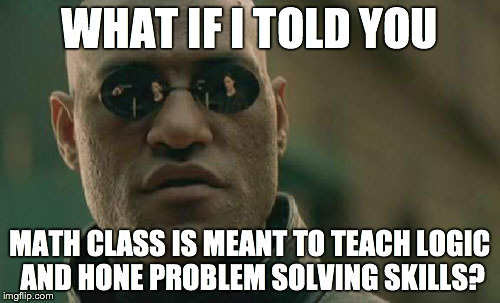 |
| Memecenter |
Looking back, I do believe that our teachers assumed that we would gather all of the information that we needed from their simpler examples to answer the more complicated questions. Whenever we had questions in class, they would direct us to review the example written on the board, or would provide yet another example following the same formula or procedure as before. They were effectively training me in procedural understanding (how to follow step by step instructions), while assuming that I would pick up conceptual understanding (the how and why of the concept) without ever explicitly teaching conceptual understanding. I was so used to procedural understanding training, that I specifically would request this from my math teachers, believing that the only way that I could do the math was if I had a formula handed to me.
As an adult, things have flipped for me. I have lost nearly all of the procedural understanding that I used to have, but instead I work through every problem using my conceptual understanding. This is a very slow process for me, since I have to work my way through each individual step before I can put all of the pieces together.
Neither of these situations are ideal.
Edugains has a fantastic poster resource that shows how instrumental (procedural) and relational (conceptual) understandings are both important to math education, and how they affect each other. As the poster states:
"Life-long learners of mathematics build new knowledge and skills in prior knowledge using the mathematical processes
Confidence and flexibility results from conceptual understanding
Accuracy and efficiency results from knowing facts and procedures"Some people like to argue about procedural versus conceptual, like they are two mountains separated by a deep valley. I do not see them as separate entities though, but rather as the two sides of a coin. As an adult, I do tend to place more importance on relational understanding, but this is more so due to a worry that it isn't being included in classrooms than that I devalue procedural understanding. I believe that when a person has a strong relational understanding, they develop procedural understanding naturally based on noticing repeated patterns while they engage in problem solving.
Procedural understanding, conceptual understanding, and problem solving are the three legs that support all of mathematical understanding.


